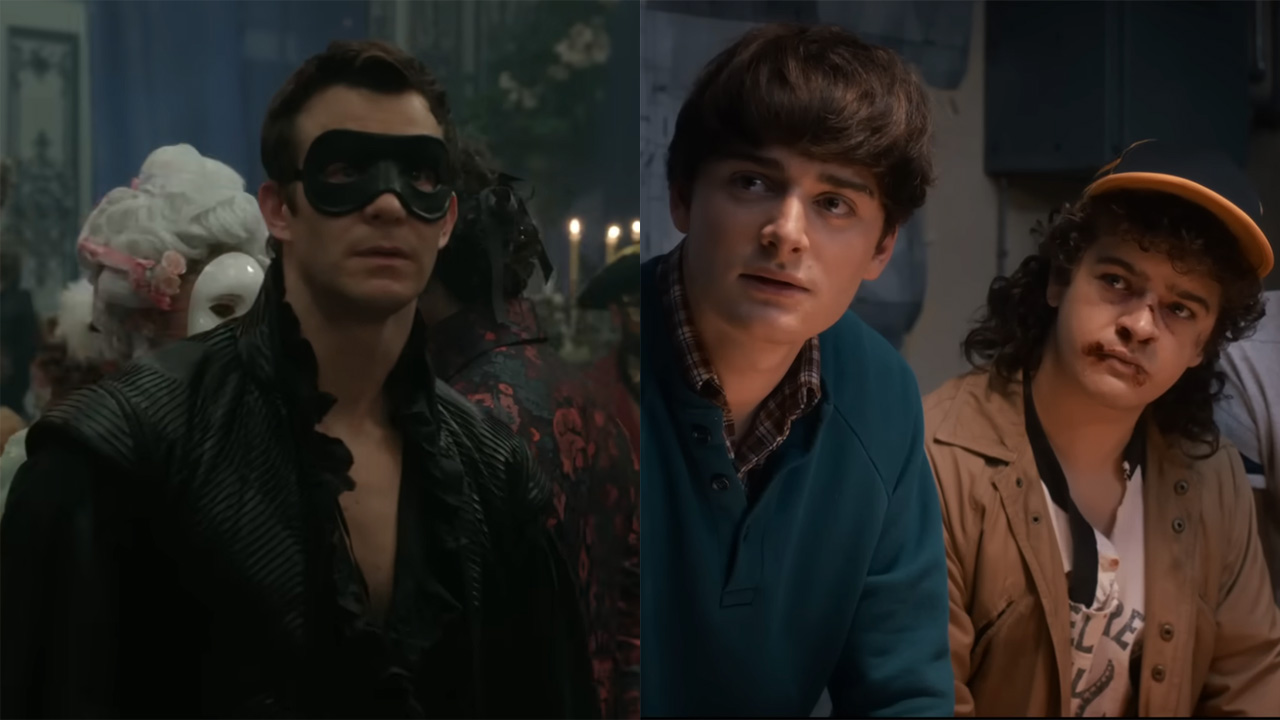I Want To Be Excited About Bridgerton Season 4 And Stranger Things Season 5, But Netflix Makes It Hard
The "new" split binge-watching model doesn't work.

Your Daily Blend of Entertainment News
You are now subscribed
Your newsletter sign-up was successful
Netflix’s 2025 schedule is chock full of content appealing to wide and varying fanbases. The streamer’s algorithmic approach has pros and cons, but one thing it does really well is generally identifies a variety of new shows and movies that genuinely appeal to people with a range of interests and tastes. Plus, there’s enough new content on a regular basis to always have something to look forward to. For me personally, those upcoming TV shows should be Bridgerton Season 4 and Stranger Things Season 5. I’m having a hard time, though.
Despite having read all of Julia Quinn’s Bridgerton books and being excited about the Sophie and Benedict plotline, and despite knowing how emotional the Stranger Things cast was to wrap up its final season, I am really having trouble generating enthusiasm for either. It has nothing to do with the cast, the storylines, or the shows themselves, and everything to do with the model Netflix has been employing on a regular basis.
Bridgerton And Stranger Things Will Suffer From The Netflix Split
For a long time, fans argued over whether watching every episode at once was better than watching one each week. Netflix was always on the binge team, but recently, they've found a model I find particularly frustrating. Instead of dropping everything at once or doing it weekly, they now drop clusters of episodes, take a break and then drop additional clusters. Sometimes the season is split into two parts. Sometimes it's split into there.
Bridgerton Season 3 was the first time I personally experienced this new split, and I did not enjoy it. I’m personally not someone who’s completely against the option of binge-watching, but this weird hybrid of the two did not do it for me. At all.
Trying to keep tabs on return dates really sucks. Waiting such a weird amount of time between episodes sucks even more. And those aren’t the only problems.
For me, the bigger issues are two-fold: Netflix shows, unlike network TV shows, don’t always set themselves up for a traditional cliffhanger or gap. Nor are they shows that are typically procedurals that wrap at the end of each episode. Instead, when creators write Netflix shows, they are doing so with binge-watching in mind. That means when the streamer decides to split them up, it's not always at a natural stopping point.
The other exhausting thing I find with the split seasons – outside of the fact it’s a shameless ploy to keep one-month subscribers from canceling – is how Netflix seasons are often only six or eight episodes. Splitting that in half means you get around three or four episodes one month and around three or so like a month later. If the network prides itself on binge-watching, I’d prefer a proper binge. But what I’d really prefer if the streamer went to a consistent multi-week rollout. There's a reason for this I'll get more into below.
Your Daily Blend of Entertainment News
Instead, Stranger Things Season 5 will actually be split into three -- yes you are reading that right -- installations, with the first hitting on November 26, the second on December 25 and the finale as a standalone on December 31. The first part of Bridgerton Season 4 will begin to air on January 29th, with the second installation on February 26th. (And honestly, if this were going to be split, I can't for the life of me figure out why one part would not be airing on Valentine's Day weekend, but I digress.)
I Actually Want Slow Roll Releases, And I Find Netflix’s Strategy Wonting
One thing traditional TV has always done better than streamers is creating water cooler moments. Netflix prides itself as a disrupter. It’s disrupted the pilot process, creating a new model where shows often get canceled after one season. It’s disrupted the traditional commercial experience (at least for some high paying subscribers). It’s created an expectation you can binge whenever you want. But the latter is not always a benefit. A lot of really great shows never get a chance to shine because they don’t get the time traditional TV shows get for people to even hear about why they are so great.
If you don’t make Netflix’s Top 10, you might as well not exist. And even if you do make the streamer’s Top 10, it may not be enough. You could still get canceled by Netflix if you don't linger for a chunk of time.
I’d think Netflix would have a vested interest in wanting to get people on the same page about their TV shows. The problem with the binge-watching model is you can never talk specifics about TV anymore, because you never know if your neighbor or pal is on the same episode or even season you are on.
Personally, I find Amazon’s model to be significantly more compelling. Release a couple of Reacher episodes, get people on the hook and then release weekly afterword. Rinse and repeat for your more popular shows. People who want to binge can totally wait and binge afterward, but if a show is popular enough, people won’t wait. Maybe Netflix could bring in binge-watching for new shows if the powers that be don’t know if they will be popular or for shorter projects, like docuseries.
Again, Netflix, I get that you feel binge-watching is core to your mission. I’m not advocating doing away with that. I just want to know my sister watched the new episode of Bridgerton on Friday night and I want to be able to read articles and talk to her about that episode before we just move on to the next one. Is that so bad?

Jessica Rawden is Managing Editor at CinemaBlend. She’s been kicking out news stories since 2007 and joined the full-time staff in 2014. She oversees news content, hiring and training for the site, and her areas of expertise include theme parks, rom-coms, Hallmark (particularly Christmas movie season), reality TV, celebrity interviews and primetime. She loves a good animated movie. Jessica has a Masters in Library Science degree from Indiana University, and used to be found behind a reference desk most definitely not shushing people. She now uses those skills in researching and tracking down information in very different ways.
You must confirm your public display name before commenting
Please logout and then login again, you will then be prompted to enter your display name.
